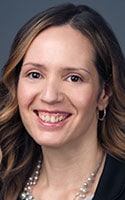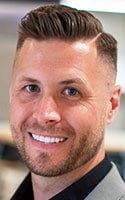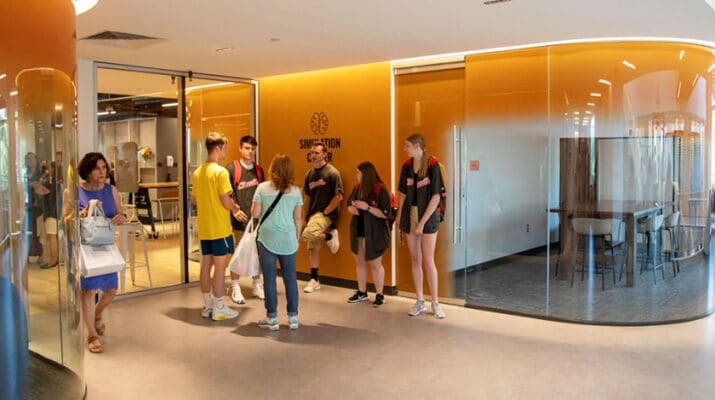By Jana Eisenberg

With its recently completed Health Professions Hub, in a brand-new building on its West Side campus, D’Youville College has come up with a win-win-win solution to address multiple, commonly known issues.
In a nutshell, the Hub is “an education, training, and community health center embedded in Buffalo’s West Side where students, medical professionals, and community members can come together.”
Eighty percent of D’Youville students train for careers in healthcare. The Hub, the school’s first outward-facing structure, is set up to be an all-encompassing and accessible community health center, a unique training facility for students and an already-proven feeder for Western New York employers. Initially funded with a lead gift from New York’s Higher Education Capital Matching Grant Program, the Hub, which officially opened in June, is on its way to fulfilling D’Youville’s mission of building healthy, thriving communities. The college describes the Hub as “the future of healthcare.”
In 2019-20, New York state deemed construction of the facility as “critical” and fast-tracked funding for the project so that it could open in time to be a pandemic resource. The Hub is a 58,751 square foot, state-of-the-art facility anchored by the Sisters Health Center at D’Youville, a primary care clinic operated by Catholic Health. With its location on the first floor, it offers a physical entry point to additional services throughout the building.
The need for such a facility is so acute partly because the neighborhoods surrounding D’Youville have for decades been inadequately serviced as far as healthcare and other basic needs; the populations face barriers in the traditional healthcare milieu. Many individuals are un- or underemployed and without health insurance. Additionally, there’s a large segment of “new Americans”—refugees and immigrants—facing additional language and culture barriers.
Other elements within the Hub designed to create a “one-stop shop for healthcare, health, and wellness” for the community, as well as a unique training facility for students, include a full-service pharmacy, a demonstration kitchen and café, a health and wellness center featuring occupational and physical therapy and chiropractic services, an interprofessional education and simulation center, high-tech classrooms, meeting rooms, open workspaces, and an event center and community engagement space.

Adam Grupka is the Hub’s director of healthcare and education; his other titles at D’Youville include assistant vice president for academic affairs, and clinical assistant professor in the physician assistant department.
He agrees that the intertwined goals of the Hub are critical. “The building is intentionally designed to be inviting to the community,” he said. “The West Side is a ‘healthcare desert,’ so this is an opportunity for its residents to receive quality, inclusive primary care.”
“The pharmacy is also on the first floor,” he continued. “During patient appointments, pharmacists come in and discuss their medications with them; they can leave the clinic with a months’ worth of their medication, or we will deliver them if need be. And when they’re here for primary care, we can also provide immediate access to or appointments for things like physical and occupational therapy, and nutritional guidance and education. These types of integrated services, long missing in this area, will improve health care outcomes, and decrease hospital readmissions, for example.”
Maria Orellana, the primary care physician at Sisters Health Center at D’Youville, is also excited about offering integrated care to people in the community, as well as giving D’Youville students a headstart in observing and participating in actual healthcare while they’re still in school.
As a Spanish speaker and a firm believer in seeing the patient beyond their medical record, Orellana said that finding out what patients need, instead of just telling them, is important. “We really want to overcome language and cultural barriers, to teach people how to lead healthier lives,” she said. Working with patients who have chronic and ongoing conditions, like obesity and diabetes, is one of her specialties. “We can offer help beyond their basic medical appointment. We have a kitchen and dietitians with free classes to improve patients’ ability to manage their own health and health programs; we’ll talk about cooking healthier meals, including to how to shop, what to look for on food labels. We are set up for all of that.”
She also agrees that making it easier to get everything at one place makes all kinds of sense for the community. “Having the clinic, the pharmacy, the lab, occupational and physical therapy, etc.—patients don’t have to go anywhere else, and that means we have less of a chance of losing them in follow-up,” she said.
Chris Nentarz, director of Thrive Wellness and Rehabilitation Center within the Hub, is also enthusiastic about the facility’s opportunities for both patients and students.
“The model of care that students can engage and get experience with through the Hub is going to be great. They are our practitioners of the future, and evidence shows that early touches with this model help create more mindful practitioners,” Nentarz said. “Simply having a lot of knowledge isn’t enough anymore; medical practitioners need to be culturally competent, and learn to work interprofessionally, in teams.”
Professions that students study for at D’Youville include traditional nursing, nurse practitioner, physician’s assistant, medical assistant, physical and occupational therapist, and pharmacist. And they will all get the chance to be a part of the teams meeting with and treating patients in D’Youville’s exciting new Health Professions Hub.
“Students will be active in every facet of the Hub, from the student-run free clinic to working in the demo kitchen, running courses, doing work-study and internships in the pharmacy and other areas,” said Grupka. “Students will rotate throughout the entire building, and be able to work in an interprofessional approach. In the simulation center, there are six rooms where we will educate both health professionals for today and for the future.”
“Healthcare needs to become less of a transactional process, and more transformational,” summed up Nentarz. “Healthcare and wellness are not a destination, but a journey. There are good, better and best paths for each individual. That’s a key principle of the D’Youville system, and there’s no better place than academia to address and work to redesign how things are done. We can research, pay attention, and work to create a new model that provides true gains for everyone. The systems must be better—we need a common language, goals and skill sets so that we can meet the needs of patients in a different way.”
Photo: College builds a facility that will help students, community and employers

